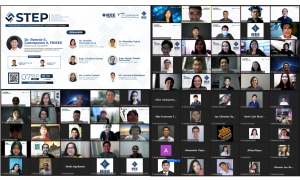Today’s story is about a group of talented IEEE Young Professionals from the Technical College of Kirkuk (Iraq), who, amidst all the instability, invested their attention to developing future leaders. IEEE Senior Member Hussein Al-Bayati along with the Member Development Officer Ahmad Alaiady and the Deputy Chairman of Iraq Sections Dr. Sattar Sadkhan delivered an inspirational and interactive lecture on ‘The Seven Habits of Highly Effective People’.

IEEE Senior member Hussein Al-Bayati delivering the lecture
Although motivation for Young Professionals around the world to tackle global problems is not lacking, they are not always equipped with the knowledge they need. They must take initiative in developing the skills and attributes to succeed in life. This was the intent behind organizing a lecture on the 7 Habits of Highly Effective People.
It is commendable, something most of us may never fully comprehend, that the IEEE Young Professionals team in Iraq is striving to produce future leaders, better leaders to lead their nation towards a conflict free country. The lecture was based on the famous Dr. Stephen Covey’s book – The Seven Habits of Highly Effective People.
Dr. Stephen Covey is a well-known author who has inspired millions around the world to lead a life of principles. His message for leading a meaningful and successful life is woven in the 7 habits of highly effective people. As David Starr Jordon, the Founding President of Stanford University, states in the very first lines of the book that there is no real excellence in all this world which can be separated from right living. And that is how the author sets out to attempt to change our deepest paradigms.

Dr. Stephen Covey
“Most people’s lives run on auto-pilot and there is no self-awareness about their daily habits. This results in the absence of a plan for life, and that they do not get the opportunity to lead their lives. Most people’s lives are affected by external factors like the environment, community, family and friends” says Hussein Al-Bayati.
HABIT 1: Be proactive – Because we are humans, we have the ability to see ourselves, our attitudes and behaviours as though we were someone else. This ability called ‘self-awareness’ has helped us advance as a race in the most significant ways. As long as we are self-aware, we can see the consequences of our words and actions and say and do the right things, we can choose. In the words of the author, our basic nature is to act and not be acted upon. Each of the 6 habits depends on the ability of being proactive. It assists in creating a balance between P(Production) and PC (Production Capacity).
HABIT 2: Start with the end in mind – The most fundamental application of this habit is to imagine the end of your life as a reference against which all life’s experience will be marked. This helps to significantly contribute daily to our lives. To start with the end in mind also means clearly knowing the destination for without that knowledge, one is lost. We either design our lives or we operate in the default mode. The most effective way to start the end in mind is to develop a personal mission statement. In essence, habit 1 lets you be the creator and habit 2 is your final creation.
HABIT 3: Put first things first – Contrary to belief, the third habit points that the key is not to prioritize what’s on schedule, but to schedule your priorities. The first step towards developing habit 3 is to make a list of roles that you play, say, in a week. Once the roles are defined, goals need to be defined and then each goal must be translated into a task. Prioritizing activities even before knowing if they will help achieve your personal mission is disastrous as you might prioritize and achieve goals which you never needed. Using a computer metaphor, habit 1 says “You are the program”, habit 2 says “Write the program” and habit 3 says “Run the program”.
HABIT 4: Think Win-Win – Win-Win is a mindset which constantly seeks to mutual benefit for all parties involved. In the words of the author, win-win sees life as a cooperative, not a competitive arena. Win-Win is a paradigm based on the fundamental principle that there is enough for everyone in this world. There are three character traits essential to the win-win paradigm which is Integrity, Maturity and the Abundance mentality.
HABIT 5: Seek First to Understand and then to be understood – Trying to understand other people’s points of views is very important as it assists us in being empathetic towards them. Not all emotions can be heard in words and hence trying to first understand other people gives us the reference we need to make them understand our point of view. This is a powerful habit of interdependence.
HABIT 6: Synergize – The exercise of all the above habits help in the habit of synergy. In the words of the author, Synergy is the essence of Principle centred leadership. It catalyses, unifies and unleashes the greatest power in people. The definition of synergy is that the whole is greater than the sum of its parts. If you plant two plants close together, their roots will combine and make the soil fertile so as to benefit both the plants. The whole is better than its parts or one plus one equals three or more.
HABIT 7: Sharpen the Saw – Habit 7 is the principle of balanced self-renewal. In the words of the author, habit 7 is taking the time to sharpen the saw instead of wasting time and energy sawing with an unsharpened saw. It’s enhancing the greatest asset we have – us. We need to replenish our body, our soul, and our minds to ensure we work effectively. Daily exercises for the physical body, nourishment for the soul by doing things we love and our minds by self-analysing daily can be powerful tools to sharpen the saw.

The lecture on the 7 habits of highly effective people saw a very good turnout which is just proof of the direction in which positive minded IEEE Young Professionals in Iraq are moving towards.
Lastly, the IEEE GOLDRush team would like to congratulate the IEEE Young Professionals team in Iraq for organizing some outstanding events amidst such unrest. We are proud to present this article to the world in the hope that Iraq can be seen in new light, in the light of hope and courage and a strong willingness to create better future leaders.
Article edited by Sneha Kangralkar, Assistant Editor, GOLDRush
Tags:Career PlanningIraq; Young Professionals





